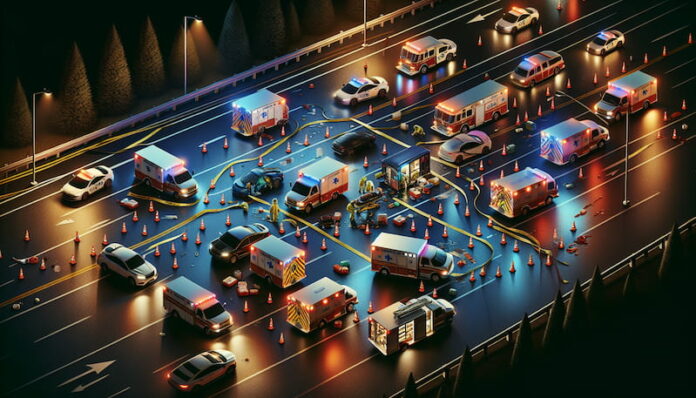Road accidents are events that bring immediate chaos and confusion. In these moments, emergency response teams become the backbone of crisis management showcasing swift action and thorough coordination. Their mission is crucial for saving lives. The assigned team reduces the impact of the incident and supports the emergency management operation, while simultaneously ensuring that bystanders and anyone else involved is cared for and safe.
Immediate Action After an Accident
An alert about an accident triggers the response team into motion. They gather vital details—where the incident happened, the severity and potential injuries. Armed with essential equipment, the team heads out, the urgency of their mission clear. Navigating traffic and coordinating with other emergency services are key. Their preparedness and rapid response are foundational in a successful rescue effort.
The team’s quick response is not just about speed, but also about bringing the right resources to the scene. They come prepared with medical equipment, rescue tools and communication devices. This preparation allows them to handle a wide range of situations effectively, from providing basic medical care to extricating victims trapped in vehicles. Their readiness is a testament to the extensive training and planning that goes into emergency response.
On-Scene Assessment and Emergency Care
Upon reaching the scene, securing the area and evaluating the situation are the team’s first steps. The first on site are usually composed paramedics and heroic firefighters, who are absolutely essential as they quickly determine the victims’ conditions, deciding who needs immediate attention. They provide critical first aid and other interventions right there, bringing not just medical help but also comfort to those involved.
The team’s assessment also involves ensuring the safety of everyone at the scene, including bystanders and other emergency personnel. They set up a perimeter, direct traffic away from the area, and mitigate any potential hazards such as fuel spills or unstable vehicles. By creating a safe working environment, they can focus on providing the best possible care to the victims without additional risks.
Linking with Healthcare Facilities
Choosing the right healthcare facility for the victims involves careful consideration of their needs and the hospital capacities. Efficient coordination ensures the victims continue to receive essential care upon arrival. The information the team collects and shares during transport is critical for a smooth handover to hospital staff.
The team’s role in linking and connecting with healthcare facilities extends beyond just transportation. They often stay in touch with the hospital staff to provide updates on the victim’s condition and estimated arrival time. This continuous communication helps the hospital prepare for the patient’s arrival, ensuring that the necessary resources and specialists are ready. This seamless transition of care is crucial for maximizing the chances of a successful recovery.
Reflecting and Preparing for the Future
After the operation, reflection is crucial. The team assesses their performance, celebrates successes and identifies areas for improvement. They also focus on community engagement, educating the public on safety to help prevent future accidents. This proactive approach is vital for enhancing responses to future emergencies.
In essence, the emergency response team’s role in road accidents is immensely vital. From the initial dispatch to the transfer of victims to medical facilities and beyond, their actions are geared towards preserving life and minimizing the accident’s aftermath. Their efficient and coordinated efforts not only speak to the core of emergency management, but also highlight the critical partnership between emergency and medical services. Together, they work towards a safer, more responsive community.
Reflection also involves taking care of the team’s own mental and emotional well-being. Responding to road accidents can be traumatic, and it’s essential for team members to have access to support services and debriefing sessions. By prioritizing their own health, they can continue to serve the community effectively in the long term. This holistic approach to emergency response recognizes the human element behind the uniforms and sirens.
Did you find this helpful? Check out our other helpful articles on our website.
Read Also
- Why comprehensive health insurance with maternity is beneficial in the UAEWelcoming a child is a significant milestone in any family’s journey. As exciting as this chapter is, it also brings with it a fair share of responsibilities—especially when it comes to planning for healthcare costs. Health insurance is now mandatory in the UAE, but as with any type of insurance, the smallest requirement might not… Read more: Why comprehensive health insurance with maternity is beneficial in the UAE
- Modern Approaches to Adolescent Mental Health Treatment for Lasting RecoveryWith increasing numbers of teens experiencing emotional and behavioral health concerns, adolescent mental health treatment has become more essential than ever. Conditions such as anxiety, depression, trauma and mood instability are on the rise, and effective support must evolve with these growing needs. Today’s treatment models blend evidence-based therapy with flexible access and holistic care, giving… Read more: Modern Approaches to Adolescent Mental Health Treatment for Lasting Recovery
- How to Find a 5-Star Dentist Near YouChoosing a dentist is more than just finding someone who can clean your teeth. It’s about selecting a trusted partner in your long-term oral health. A 5-star dentist not only provides excellent clinical care but also delivers a positive patient experience, from the moment you walk in until the moment you leave. Whether you’re new… Read more: How to Find a 5-Star Dentist Near You
- Your Easy-Peasy Guide to Brewing Amazing MatchaHey there! So, you’ve heard all the buzz about matcha – that vibrant green powder that’s not just pretty but packed with good stuff? It can seem a little fancy and intimidating at first, but trust me, making a delicious cup at home is simpler than you think. Forget complicated ceremonies for now; let’s just… Read more: Your Easy-Peasy Guide to Brewing Amazing Matcha
- Embracing Holistic Wellness: Insights from a Lansing, MI Health CenterReframing Health: Moving Beyond Symptom Management Treating only symptoms often offers quick relief, yet long-term results stay out of reach. When care zeroes in on isolated complaints, the bigger picture, such as stress, behavior, or lifestyle, often gets missed. Research shows that whole-person care, which looks at physical, emotional, and environmental factors, yields better outcomes… Read more: Embracing Holistic Wellness: Insights from a Lansing, MI Health Center
- VO₂ Max Testing Explained: What It Is & Why It Matters for Your HealthVO₂ max sounds like a term reserved for elite athletes, but it’s among the most accurate measures of your lifetime and general condition. Moreover, it goes beyond performance. Monitoring your VO₂ max will help you to ascertain your body’s capacity to control stress, its oxygen consumption efficiency, and your internal ageing process. If you have… Read more: VO₂ Max Testing Explained: What It Is & Why It Matters for Your Health
- So, what exactly is matcha?Think of matcha as green tea turned up to eleven! Instead of steeping leaves and tossing them out, matcha is made by grinding whole green tea leaves into this super-fine, vibrant green powder. You whisk it right into hot water (or milk!), meaning you’re drinking the entire leaf. That’s why folks say you get way… Read more: So, what exactly is matcha?
- How to Tell When It’s Time for Professional Senior Care SupportCaring for an aging loved one is a journey filled with love, patience, and difficult decisions. One of the toughest choices families face is knowing when it’s time to seek extra help. In this article, trusted Los Angeles caregivers for seniors explore the signs that it might be time to bring in professional support, not… Read more: How to Tell When It’s Time for Professional Senior Care Support









